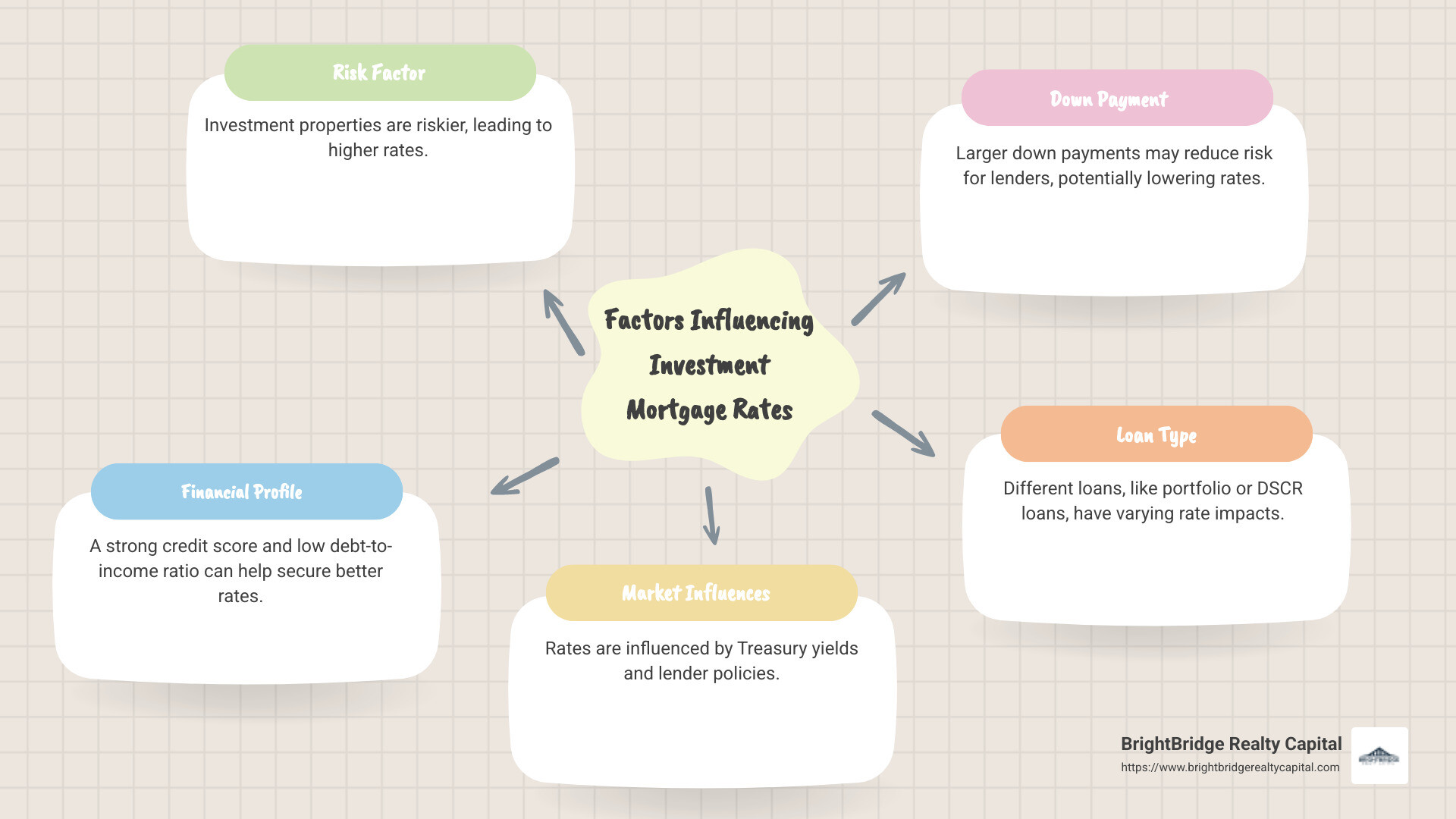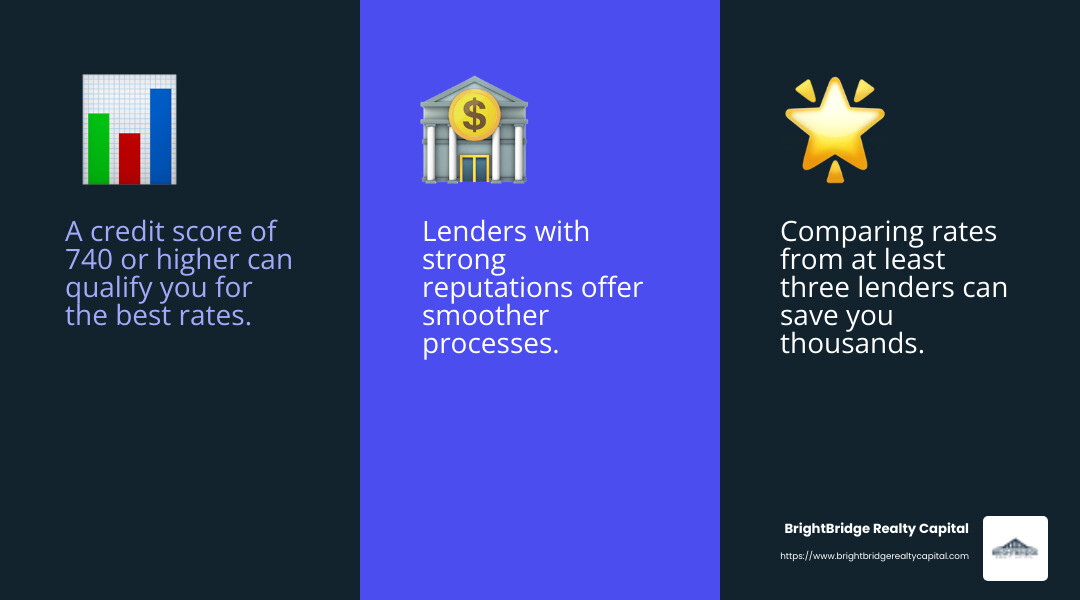Navigating the Maze of 30-Year Fixed Investment Mortgage Rates

Investment mortgage rates 30 year fixed are a crucial factor for real estate investors seeking to expand their portfolios efficiently and profitably. These rates typically range from 7% to 7.75%, depending on factors like credit score and down payment. Here’s a quick insight:
- Risk Factor: Investment properties are seen as riskier, leading to higher rates compared to primary residences.
- Financial Profile Matters: A strong credit score and low debt-to-income ratio can help secure a better rate.
- Market Influences: Rates are influenced by Treasury yields and lender policies.
Navigating the maze of mortgage rates, especially for investments, is complex but vital. Understanding the intricacies can profoundly impact your investment decisions. We'll explore the dynamics behind investment mortgage rates 30 year fixed, helping you make informed choices.
With investment properties deemed more risky due to reliance on rental income, securing favorable rates can be challenging. However, with proper knowledge and strategy, it's possible to negotiate rates that align with investment goals, ensuring profitable ventures.

Understanding 30-Year Fixed Investment Mortgage Rates
When it comes to investment mortgage rates 30 year fixed, understanding the landscape is key. These rates are often higher than those for primary residences, but why is that the case?
Interest Rates and Risk Factors
Investment properties are seen as riskier by lenders compared to primary residences. This is because the income to pay the mortgage often comes from tenants. If a tenant stops paying rent, there's a higher chance the property owner might default on the loan. As a result, lenders typically charge interest rates that are a half to a full percentage point higher than those for primary residences.
Primary Residences vs. Investment Properties
For a primary residence, lenders generally offer lower interest rates. This is because homeowners are more likely to prioritize mortgage payments to keep a roof over their heads. In contrast, an investment property is not the owner's primary home, leading to perceived higher risk.
Consider this: if you're buying a home to live in, the interest rate might be around 6.70% for a 30-year fixed mortgage. However, if you're buying the same property as an investment, expect rates closer to 7% or more.
Market Influences
Two key factors influence these rates: 10-year Treasury yields and investor demand. When Treasury yields rise, mortgage rates often follow. Additionally, lenders add a cushion to rates for investment properties to compensate for possible losses. Your financial profile, including your credit score and debt levels, also plays a significant role in the rate you're offered.
Understanding these dynamics is crucial for making informed investment decisions. By knowing what affects your mortgage rate, you can better prepare and possibly negotiate more favorable terms.
Factors Influencing Investment Mortgage Rates 30 Year Fixed
When navigating investment mortgage rates 30 year fixed, several key factors come into play. These include your credit score, down payment, and debt-to-income ratio (DTI). Let's break these down.
Credit Score
Your credit score is a critical element in determining your mortgage rate. A higher score often translates to lower interest rates, as it signals to lenders that you're a reliable borrower. Generally, a credit score of 740 or higher is ideal for securing the best rates. If your score is lower, consider taking steps to improve it before applying for a mortgage. Paying off existing debts and ensuring timely payments can boost your score over time.
Down Payment
A larger down payment can significantly impact your mortgage rate. Lenders view a substantial down payment as a sign of financial stability and commitment to the property, reducing their risk. While the minimum down payment varies by lender, offering more than the required amount can help lower your interest rate. This approach not only reduces your monthly payments but also decreases the total interest paid over the life of the loan.
Debt-to-Income Ratio (DTI)
Your DTI ratio measures your total monthly debt payments against your gross monthly income. Lenders use this ratio to assess your ability to manage monthly payments and repay debts. A lower DTI ratio indicates a strong financial position, which can lead to more favorable mortgage rates. Aim to keep your DTI ratio below 36%, if possible, to improve your chances of securing a better rate.
Practical Tips
- Improve Your Credit Score: Regularly check your credit report for errors and work on improving your score.
- Save for a Larger Down Payment: Plan ahead and save more than the minimum requirement to lower your rate.
- Manage Your Debt: Pay down existing debts to improve your DTI ratio before applying for a mortgage.
By understanding and optimizing these factors, you can position yourself to secure the best possible investment mortgage rates. This knowledge empowers you to make informed decisions and potentially save thousands over the life of your loan.
Types of Investment Property Loans
When it comes to financing an investment property, there are several loan options available. Each type has its own set of features, benefits, and requirements. Let's explore the most common ones.
Conventional Loans
Conventional loans are the most widely available type of investment property loan. Offered by banks and credit unions, these loans are typically resold to Fannie Mae or Freddie Mac. If you're considering a conventional loan for your investment property, be prepared to make a down payment of 15% to 25%.
The benefit? Conventional loans often come with competitive interest rates. However, they also have stricter credit, debt-to-income, and down payment requirements compared to loans for primary residences.
Portfolio Loans
Portfolio loans are held by the lender and not sold on the secondary market. This means lenders can set more flexible guidelines. If you have a unique financial situation or need a custom loan solution, a portfolio loan might be a good fit.
These loans can be especially beneficial if you're looking to finance multiple properties or have non-traditional income sources. However, keep in mind that interest rates might be higher due to the increased risk for the lender.
DSCR Loans
For investors focused on the income potential of a property, DSCR loans (Debt-Service Coverage Ratio loans) are a great option. These loans are approved based on the property's ability to generate enough income to cover the debt payments.
A DSCR of 1 or higher indicates the property can cover its debt, making it attractive to lenders. This type of loan is ideal for investors who might not have a strong personal credit score but have a property with solid income potential.
Non-Warrantable Condo Loans
If your investment property is a condo, you might need a non-warrantable condo loan. These are designed for condos that don't meet the standard criteria set by Fannie Mae or Freddie Mac, such as a high number of rental units or commercial space.
These loans can be harder to find, and they often come with higher interest rates. However, they provide a necessary solution for investors interested in condos that fall outside conventional lending guidelines.
By understanding these different types of investment property loans, you can choose the one that best aligns with your investment strategy and financial situation. Each loan type offers unique benefits and challenges, so consider your long-term goals and current financial standing when making a decision.
How to Secure the Best Investment Mortgage Rates
When you're eyeing the best investment mortgage rates 30 year fixed, preparation is key. Here's how you can position yourself to snag those attractive rates.
Credit Improvement
First things first—your credit score matters. Lenders offer the best rates to borrowers with a credit score of 740 or higher. If your score needs a boost, take steps to improve it before applying. This might mean paying down debt, correcting errors on your credit report, or simply making sure all your bills are paid on time.
Rate Quotes
Don't settle for the first rate you see. Shopping around can save you thousands over the life of your mortgage. Get rate quotes from at least three different lenders. This could include community banks, credit unions, or lenders you’ve worked with before. Don't forget to compare the APR, which includes the interest rate plus any lender fees and points.
Borrower Experience
The lender you choose can make or break your experience. Look for lenders with good reputations—read consumer reviews, check ratings on review sites, and see if they've won any awards for customer service. A lender with a strong track record will likely offer a smoother process and better support.

Final Tips
- Ask for a better rate. Sometimes, simply asking can get you a better deal.
- Consider a larger down payment. A bigger down payment can sometimes secure better rates.
- Understand your DTI ratio. Lenders like to see a healthy debt-to-income ratio, so work to improve yours if needed.
By focusing on these areas, you can improve your chances of securing the best possible rates for your investment property. A little preparation goes a long way in navigating the mortgage landscape.
Frequently Asked Questions about Investment Mortgage Rates 30 Year Fixed
Why are investment property rates higher?
Investment property rates are generally higher than those for primary residences. Why? It's all about risk. Lenders see investment properties as riskier investments. If you're relying on rental income to pay the mortgage, there's always a chance that a tenant might not pay on time—or at all. This increases the possibility of default, making lenders cautious. To cushion against this risk, lenders typically add a half to a full percentage point to the interest rate for investment properties.
How can I lower my investment mortgage rate?
Lowering your investment mortgage rate is possible with a few strategic moves:
Boost Your Credit Score: Aim for a credit score of 740 or higher. This can be achieved by paying off debts, correcting errors on your credit report, and ensuring timely bill payments.
Increase Your Down Payment: A larger down payment reduces the lender's risk. If you can afford it, putting down more than the minimum can help you secure a better rate.
Shop Around for Rates: Don’t just settle for the first offer. Get quotes from multiple lenders and compare not just the interest rates, but also the APRs, which include additional fees.
What is the difference between investment and primary residence loans?
The key differences between loans for investment properties and primary residences boil down to interest rates and underwriting requirements:
Interest Rates: As mentioned earlier, investment mortgage rates tend to be higher due to the perceived risk.
Underwriting Requirements: Lenders scrutinize investment property loans more closely. They may require a higher credit score, a larger down payment, and a lower debt-to-income ratio compared to loans for primary residences. This thorough evaluation helps lenders assess the borrower's ability to manage the additional risk associated with investment properties.
Armed with these insights, you're better prepared to steer the complexities of investment mortgage rates and make informed decisions for your property investments.
Conclusion
Navigating the complex world of investment mortgage rates 30 year fixed can be daunting, but with the right partner, it doesn't have to be. At BrightBridge Realty Capital, we specialize in offering competitive rates and fast closings, making your investment journey smoother and more efficient.
Our unique approach as a direct private lender allows us to cut out the middleman, providing you with rates that are hard to beat. We understand that every investor's needs are different, which is why we offer customized loan solutions custom to your specific goals. Whether you're flipping properties, building from the ground up, or expanding your rental portfolio, our flexible funding options are designed to keep your projects on track.
Fast closings are our hallmark. We pride ourselves on our ability to close deals often within a week, ensuring you can seize opportunities as they arise without unnecessary delays. Our nationwide reach means you have access to reliable lending solutions no matter where your investment properties are located.
Ready to take the next step in your real estate investment journey? Explore our loan options today and experience the BrightBridge difference. With our expert support and seamless process, you're never alone in navigating the maze of investment mortgage rates.


